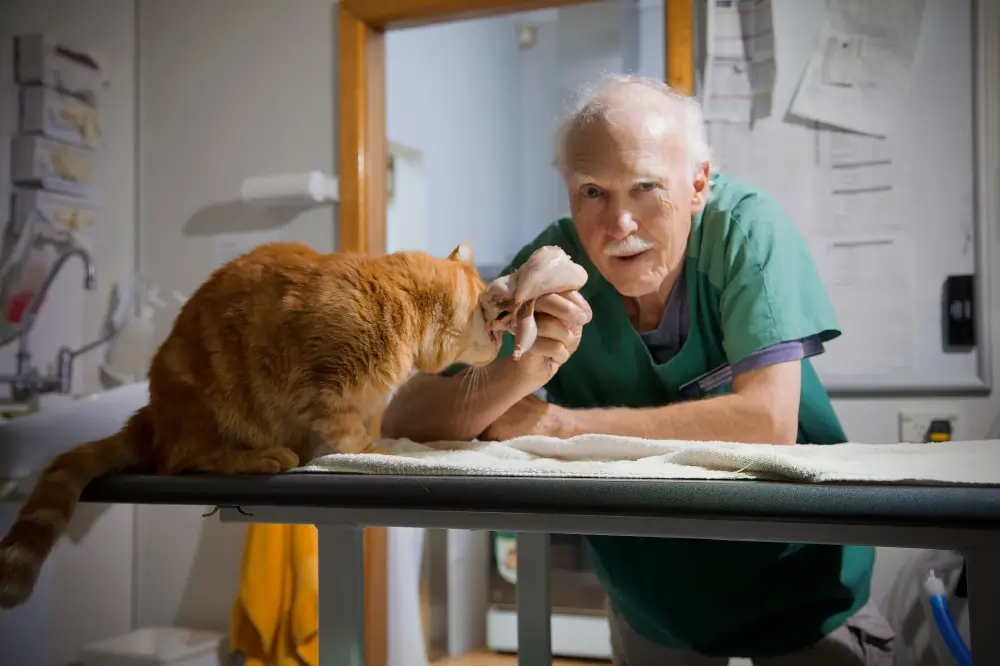Could ultra-processed food be making your pet sick?

Dr Tom Lonsdale
- Published
- Opinion & Analysis

Tinned pet food is convenient and often inexpensive. But claims it could be healthy are hard to swallow, warns Dr Tom Lonsdale
As we enter 2025, you might be thinking about making healthier choices for the year ahead – not only for yourself but for your pets, too. You’ve heard about the dangers of ultra-processed food for humans: heart disease, obesity, diabetes, bowel issues, and cancer. But what about your dogs and cats?
Unlike humans, who eat a variety of foods, many pets eat the same canned or bagged food for every meal, their entire lives. While humans live an average of 80 years, pets with shorter lifespans experience diseases like arthritis, kidney problems, diabetes, and cancer earlier and more severely. Bad breath, skin issues, and digestive problems are often the first signs of trouble. Add the stress and expense of repeated vet visits, and it’s clear why many pet owners want to improve their furry friends’ diets.
Unfortunately, navigating pet nutrition can be overwhelming. TV ads and supermarket shelves are dominated by brightly packaged processed food, promising health and convenience. Even prescription diets sold by vets are often industrial products with long shelf lives. Yet, there’s no solid scientific evidence proving these canned and packaged foods are suitable for daily feeding. Manufacturers sidestep the responsibility to prove safety, and regulators rarely intervene.
In response, raw diets are becoming popular, with companies offering raw meat, vegetables, and supplements. While these diets often appear to improve pet health, much of the benefit comes simply from stopping the consumption of processed food. Any homemade or alternative diet can seem like a step up from industrial junk.
To understand what works best for your pet, look to their natural instincts. Dogs love gnawing on raw, meaty bones and burying leftovers for later. Cats are natural hunters, stalking small prey like rodents and birds. Even feral dogs and cats thrive on raw food they hunt or scavenge.
For domestic pets, a balanced compromise is feeding raw meaty bones. Zookeepers have long fed raw bones to wolves, lions, and tigers, and this approach works well for pets too. Raw meaty bones are nature’s perfect food and medicine for carnivores.
Raw meaty bones offer numerous health benefits, including:
- Endorphin release: Chewing provides physical exercise and immune stimulation.
- Dental health: Prevents gum disease and cleans teeth.
- Digestive support: Stimulates gut enzymes and maintains a healthy microbiome.
- Nutrition: Provides essential nutrients for cell growth and repair.
- Stress relief: Promotes natural behaviours, reducing anxiety.
- While raw bones covered in fur or feathers are ideal, butchered bones of the right size can still deliver significant health benefits.
Interestingly, the same principles of avoiding ultra-processed food apply to us. By observing our pets thriving on natural diets, humans can learn valuable lessons about nutrition and health.

Dr. Tom Lonsdale BVetMed MRCVS is a distinguished veterinary clinician and author with over 50 years of experience. Known internationally as a pioneer and authority on the nutritional and medicinal features of a natural diet for pets. Tom is a vocal advocate against what he perceives as collusion between the veterinary establishment and the pet food industry. He has earned the moniker, ‘The Whistleblower Vet’, for debunking misinformation about pet health.
Main image: Courtesy Dr Tom Lonsdale
RECENT ARTICLES
-
 Why Europe’s finance apps must start borrowing from each other’s playbooks
Why Europe’s finance apps must start borrowing from each other’s playbooks -
 Why universities must set clear rules for AI use before trust in academia erodes
Why universities must set clear rules for AI use before trust in academia erodes -
 The lucky leader: six lessons on why fortune favours some and fails others
The lucky leader: six lessons on why fortune favours some and fails others -
 Reckon AI has cracked thinking? Think again
Reckon AI has cracked thinking? Think again -
 The new 10 year National Cancer Plan: fewer measures, more heart?
The new 10 year National Cancer Plan: fewer measures, more heart? -
 The Reese Witherspoon effect: how celebrity book clubs are rewriting the rules of publishing
The Reese Witherspoon effect: how celebrity book clubs are rewriting the rules of publishing -
 The legality of tax planning in an age of moral outrage
The legality of tax planning in an age of moral outrage -
 The limits of good intentions in public policy
The limits of good intentions in public policy -
 Are favouritism and fear holding back Germany’s rearmament?
Are favouritism and fear holding back Germany’s rearmament? -
 What bestseller lists really tell us — and why they shouldn’t be the only measure of a book’s worth
What bestseller lists really tell us — and why they shouldn’t be the only measure of a book’s worth -
 Why mere survival is no longer enough for children with brain tumours
Why mere survival is no longer enough for children with brain tumours -
 What Germany’s Energiewende teaches Europe about power, risk and reality
What Germany’s Energiewende teaches Europe about power, risk and reality -
 What the Monroe Doctrine actually said — and why Trump is invoking it now
What the Monroe Doctrine actually said — and why Trump is invoking it now -
 Love with responsibility: rethinking supply chains this Valentine’s Day
Love with responsibility: rethinking supply chains this Valentine’s Day -
 Why the India–EU trade deal matters far beyond diplomacy
Why the India–EU trade deal matters far beyond diplomacy -
 Why the countryside is far safer than we think - and why apex predators belong in it
Why the countryside is far safer than we think - and why apex predators belong in it -
 What if he falls?
What if he falls? -
 Trump reminds Davos that talk still runs the world
Trump reminds Davos that talk still runs the world -
 Will Trump’s Davos speech still destroy NATO?
Will Trump’s Davos speech still destroy NATO? -
 Philosophers cautioned against formalising human intuition. AI is trying to do exactly that
Philosophers cautioned against formalising human intuition. AI is trying to do exactly that -
 Life’s lottery and the economics of poverty
Life’s lottery and the economics of poverty -
 On a wing and a prayer: the reality of medical repatriation
On a wing and a prayer: the reality of medical repatriation -
 Ai&E: the chatbot ‘GP’ has arrived — and it operates outside the law
Ai&E: the chatbot ‘GP’ has arrived — and it operates outside the law -
 Keir Starmer, Wes Streeting and the Government’s silence: disabled people are still waiting
Keir Starmer, Wes Streeting and the Government’s silence: disabled people are still waiting -
 The fight for Greenland begins…again
The fight for Greenland begins…again


























